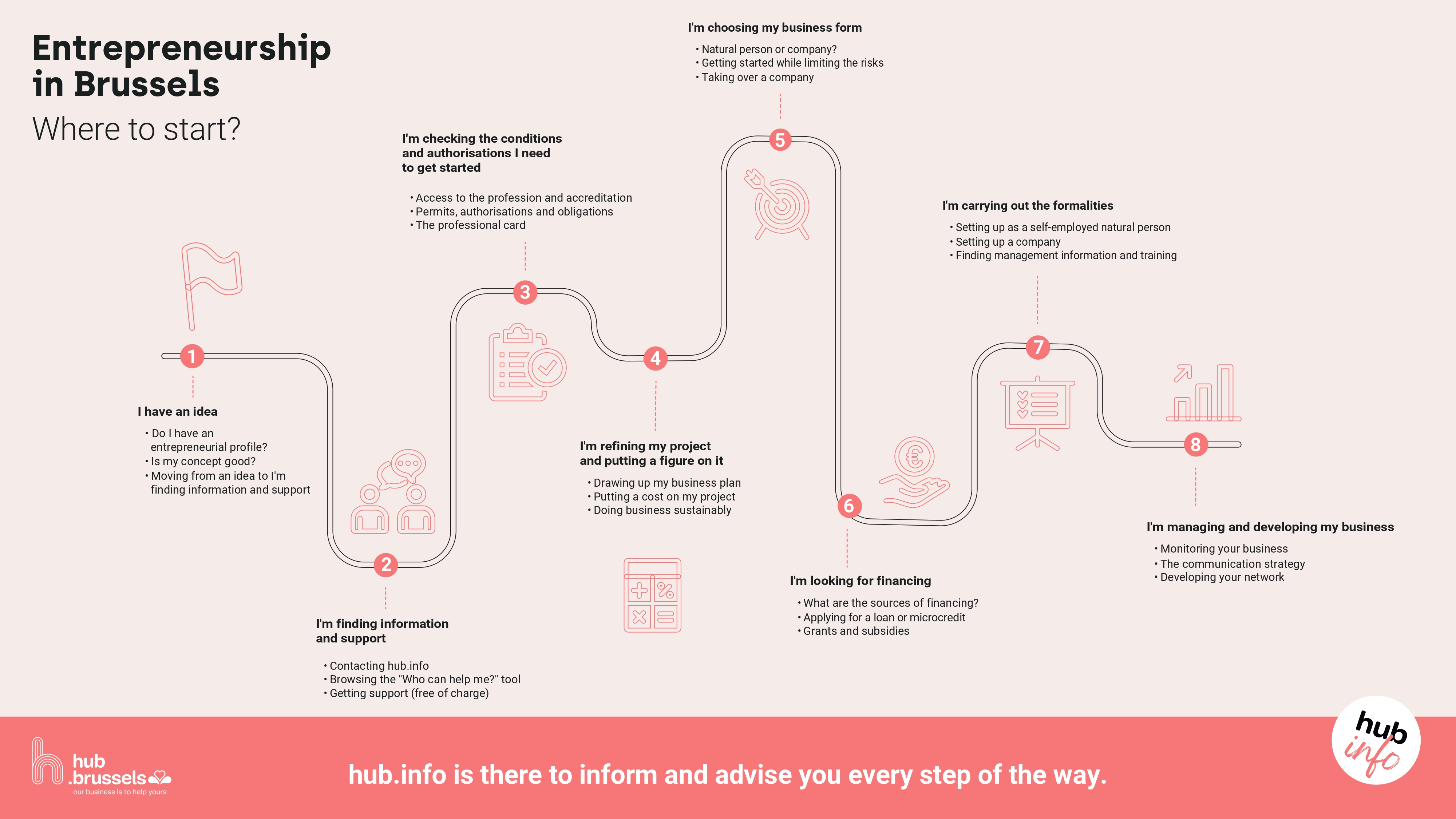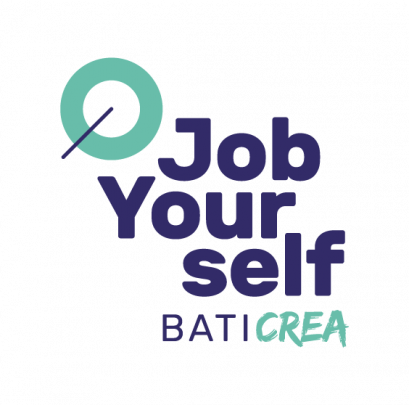You aspire to be an entrepreneur but don't know where to start? There's no need to panic. You're not alone in facing this dilemma, as there is no standard playbook for new entrepreneurs. However, one thing is certain: the roadmap outlined below can guide you in the right direction.
1. Conditions to become an entrepreneur
Before we dive in, let's clarify a few things. Being an entrepreneur doesn't necessarily mean having the "idea of the century" and securing millions in capital. Whether you're a micro-entrepreneur, franchisee, retailer, freelancer, farmer, or architect, the type of business type is irrelevant. They are all entrepreneurs from the moment they are legally independent and act under their own responsibility.
To become self-employed in Belgium, you must meet specific prerequisites. You must:
- be 18 or older;
- not have been declared incompetent and not be on probation;
- be able to exercise all of your civil and political rights;
- be allowed to engage in all activities related to running a self-employed business.
If you are Belgian or from an EU Member State or from Lichtenstein, Norway, Iceland or Switzerland, you can get started immediately.
If you don’t meet this prerequisite condition, you will need to obtain a professional card to be able to be self-employed in Belgium.
2. Do You Have the Entrepreneurial Talent?
Success in a business creation project depends not only on economic and financial factors but primarily on your state of mind, starting with your motivation. Why do you want to start a business? What triggered this desire? As an entrepreneur, you must be prepared to face various challenges. Can you handle periods of intense work and stress, bounce back from setbacks, learn from your mistakes, and persevere? Take the test to assess whether you possess the right profile, motivation, and health to create a sustainable business.
List your assets on paper to determine if they benefit your business. If necessary, seek input from family and friends for a clearer perspective. Others often have insights into your strengths and weaknesses. They might even suggest that entrepreneurship isn't the best path for you. If that's the case, remember that success in life can take various forms, and not everyone is suited for entrepreneurship. Some people just don't have the time, personality, family or financial situation to start their own business.
3. Define your project
There are two situations to consider:
- You already have a basic idea of your project.
- Great! You can proceed directly to step 4.
- You want to venture out on your own but are unsure about the sector.
- Don’t think in terms of an idea, but in terms of a problem. The idea doesn’t matter. If it isn’t a solution to a frustrating situation or it doesn’t meet a consumer need, it won’t work. By thinking in terms of a problem to be solved, you can build a foundation which can receive many ideas. In fact, there is rarely a single solution to a given problem. Here are our tips to find a good idea.
Defining a Sustainable Business Model
Do you want to contribute to the transition economy and start a business rooted in sustainability values? There are a number of specialist organisations that can work with you from the outset to establish the contours of a sustainable business model!
4. Family support
Before embarking on a business venture, it's crucial to discuss your plans with your family. Their support, understanding, and empathy can be instrumental in helping you navigate challenges and contribute significantly to the success of your company. However, it's essential that they fully grasp the significance of your project. Remember that your loved ones also require your support.
5. Assessing Your Training Needs
Becoming an entrepreneur doesn't necessarily require a specific degree. However, it's essential to evaluate whether your skills align with your project. Entrepreneurship requires basic knowledge of accounting, management, taxes, marketing, and more. Consider whether you need to acquire basic management skills, essentially a mini-degree that attests to your business management knowledge. Additionally, certain activities are regulated, necessitating additional professional competencies. When establishing your business, consider enrolling in training courses. They will enhance your understanding of the skills and qualities required to lead a successful company.
6. Exploring Your Business Idea
Take the time to define the core of your project, delineate your company's offerings, specify the unique aspects of your services, and explain how they differentiate you from existing market players (your added value). Gathering data and insights through market studies is essential—details about your target market, competitors, market needs, potential customer base, consumption patterns, and current pricing.
Answer key questions:
- Are you planning to start your business alone?
- Would acquiring an existing business rather than creating a new one be a viable option?
- Will this venture become your main business activity?
- Will you operate from home, or will you need to find business premises?
7. Testing Your Idea
Statistics show that 90% of new products don't survive the first three years. You can mitigate this risk by using an MVP (Minimum Viable Product), prototype, pilot project, or proof of concept. These terms all refer to the same goal: refining your product or service before launching it.
Another effective way to test your idea is by participating in an incubator, accelerator, or hackathon. Joining a hackathon as a team member provides valuable feedback on your ideas and potential solutions. Some participants even meet future business partners with complementary skills. Additionally, these events offer access to coaches and mentors who can provide insights into your project. Winning a contest at one of these events and receiving a prize can further support your project's development.
8. Seeking Assistance
It's widely recognized that businesses that receive support during their early stages tend to be more sustainable. In Brussels, there is a broad range of support structures available, which you can explore using our online tool. These organizations can assist you at various stages of your company's development. Importantly, many of these services are either free or affordable. Identify the contacts who can support you from the outset. Furthermore, these organisations offer workshops and events that facilitate networking, a valuable aspect of project development.
9. Refining Your Project: Business and Financial Plans
As you progress, based on insights from market studies, you'll discover ways to enhance your idea. Data analysis will shed light on the operational conditions of your business, enabling you to plan accordingly. Ensure that your business plan incorporates all relevant information.
Having adequate financial resources to sustain your project and meet your personal needs until you can draw a salary from the business is critical. This is where your financial plan comes in. It's the most crucial document, translating the information gathered during your preparations into concrete figures. Assess your expenses, funding requirements, and potential resources, such as capital, grants, subsidies, or bank loans. Determine your revenue model and calculate projected income based on your pricing strategy.
Identify financial solutions and contacts who can assist you right from the start. Do you require a loan, seek microcredit, or plan to launch a crowdfunding campaign? Be aware of where to find guarantees if needed.
The format of your business plan isn’t important, but a well-documented and quantified project is always more convincing! You can always use our free template.
10. Are You Prepared?
Many individuals dream of starting their own businesses but hesitate to take the leap. They may prefer the comfort of their current situation or believe they need a groundbreaking idea or flawless preparation. However, entrepreneurship doesn't demand a perfect pedigree or a high-level degree. There just isn’t an ideal moment to get started.
Overthinking obstacles can lead to abandoning your entrepreneurial aspirations. Entrepreneurship is primarily a mindset cultivated daily, centered on a positive attitude and readiness for action. If you have a business idea, get going now! But remember that every project requires thorough, uninterrupted work and dedication.

Who can help me ?







